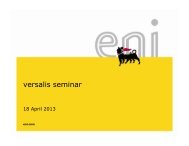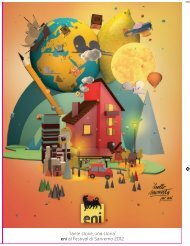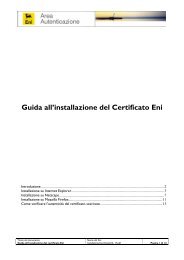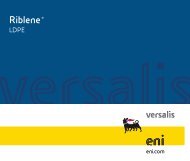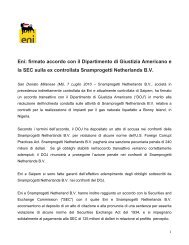È in corso il restauro conservativo del Duomo di Milano. Un ... - Eni
È in corso il restauro conservativo del Duomo di Milano. Un ... - Eni
È in corso il restauro conservativo del Duomo di Milano. Un ... - Eni
You also want an ePaper? Increase the reach of your titles
YUMPU automatically turns print PDFs into web optimized ePapers that Google loves.
SCENARI - SCENARIOS<br />
<strong>in</strong>seriti <strong>in</strong> una struttura organica <strong>di</strong> voci alfabeticamente<br />
organizzate.<br />
La proposta f<strong>in</strong>ale fu <strong>di</strong> abbandonare la struttura tra<strong>di</strong>zionale<br />
per adottare un mo<strong>del</strong>lo organizzato secondo volumi tematici,<br />
costituiti da saggi monografici che trattassero <strong>in</strong> sequenza<br />
logica e <strong>in</strong> modo compiuto le varie l<strong>in</strong>ee <strong>in</strong> cui si articola<br />
l’<strong>in</strong>dustria <strong>del</strong> petrolio. Per sod<strong>di</strong>sfare comunque l’esigenza<br />
<strong>di</strong> autoreferenzialità, si decise <strong>di</strong> <strong>in</strong>serire nel qu<strong>in</strong>to<br />
volume “Fondamenti e strumenti” <strong>il</strong> <strong>di</strong>zionario enciclope<strong>di</strong>co,<br />
organizzato secondo un ord<strong>in</strong>amento alfabetico che<br />
avrebbe fornito al lettore i necessari strumenti per muoversi<br />
agevolmente all’<strong>in</strong>terno <strong>del</strong>l’opera.<br />
Il mo<strong>del</strong>lo non aveva precedenti nel campo <strong>del</strong>le più classiche<br />
enciclope<strong>di</strong>e tecnico-scientifiche ma richiamava per<br />
certi aspetti i trattati tipici <strong>del</strong>la letteratura tecnica, anche<br />
<strong>del</strong>la più recente (Petroleum Ref<strong>in</strong><strong>in</strong>g, 5 volumi Technip<br />
Publ. 2000).<br />
Ovviamente <strong>il</strong> rischio, che peraltro fu ben chiaro f<strong>in</strong> dall’<strong>in</strong>izio,<br />
era <strong>di</strong> scadere <strong>in</strong> un trattato <strong>di</strong> manualistica senza tuttavia<br />
riuscire a conseguire quel risultato che i manuali <strong>di</strong> qualità<br />
si prefiggono: trattare <strong>in</strong> modo esaustivo la materia e<br />
fornire un supporto pratico agli specialisti <strong>del</strong> settore.<br />
“L’Enciclope<strong>di</strong>a – citando Tullio Gregory – come opera che<br />
raccoglie <strong>in</strong> modo sistematico nozioni su tutte le <strong>di</strong>scipl<strong>in</strong>e<br />
o su specifici argomenti deve dare i fondamenti e le strutture<br />
dei saperi, cogliere i mutamenti negli <strong>in</strong><strong>di</strong>rizzi e nei<br />
meto<strong>di</strong> <strong>di</strong> ricerca, <strong>in</strong><strong>di</strong>care i rapporti fra le varie aree <strong>di</strong>scipl<strong>in</strong>ari”.<br />
Era la primavera <strong>del</strong> 2004, ad opera <strong>in</strong> avanzato stato <strong>di</strong> realizzazione,<br />
quando venne pubblicata la Encyclope<strong>di</strong>a of<br />
Energy, (6 volumi - Elsevier Publ. 2004) che <strong>in</strong> certa misura<br />
seguiva un mo<strong>del</strong>lo <strong>di</strong> impostazione monografica <strong>del</strong>le<br />
voci. Tuttavia manteneva ancora l’ord<strong>in</strong>amento alfabetico,<br />
cosicché non riusciva a realizzare la sovrastruttura logica <strong>in</strong><br />
grado <strong>di</strong> aggregare le monografie nei relativi f<strong>il</strong>oni tematici.<br />
Il mo<strong>del</strong>lo organizzativo ut<strong>il</strong>izzato nello sv<strong>il</strong>uppo <strong>del</strong> lavoro<br />
si rifà allo schema tra<strong>di</strong>zionalmente ut<strong>il</strong>izzato da Treccani:<br />
un Comitato <strong>di</strong> Coord<strong>in</strong>amento costituito dai Direttori e dagli<br />
esperti <strong>del</strong>le varie tematiche con <strong>il</strong> supporto esterno <strong>di</strong><br />
specialisti <strong>del</strong>le s<strong>in</strong>gole materie.<br />
Il Comitato <strong>di</strong> Coord<strong>in</strong>amento ha compiti molto operativi:<br />
supporta l’impostazione <strong>del</strong>l’opera, suggerisce e valuta<br />
membri esterni e <strong>in</strong>terni da contattare, <strong>in</strong><strong>di</strong>ca possib<strong>il</strong>i autori<br />
<strong>di</strong> voci, verifica la coerenza <strong>di</strong> impostazione e <strong>di</strong> realizzazione<br />
dei testi, <strong>del</strong>la produzione iconografica e <strong>del</strong>le traduzioni.<br />
Anche la realizzazione <strong>in</strong> due l<strong>in</strong>gue, nuova per l’Istituto<br />
Treccani, ha comportato <strong>di</strong>versi ord<strong>in</strong>i <strong>di</strong> problemi e le scelte<br />
conseguenti non sono sempre state <strong>del</strong> tutto agevoli.<br />
In realtà l’opera nasce già <strong>in</strong> larga misura b<strong>il</strong><strong>in</strong>gue. Su 220<br />
autori che hanno scritto almeno un contributo, quasi <strong>il</strong> 40%<br />
scrive <strong>in</strong> <strong>in</strong>glese e ciò <strong>in</strong><strong>di</strong>pendentemente dal fatto che questa<br />
sia la loro madrel<strong>in</strong>gua. Vale per tutti l’esempio <strong>del</strong>la sezione<br />
giuri<strong>di</strong>ca nella quale gli autori sono quasi esclusivamente<br />
orig<strong>in</strong>ari dai paesi produttori <strong>di</strong> petrolio <strong>di</strong> cui <strong>il</strong>lustrano<br />
le norme legislative.<br />
E poiché l’<strong>in</strong>dustria <strong>del</strong> petrolio, sia <strong>di</strong> upstream che <strong>di</strong><br />
raff<strong>in</strong>azione, nacque pr<strong>in</strong>cipalmente negli Stati <strong>Un</strong>iti (Texas,<br />
Louisiana, California, Ohio) spesso i term<strong>in</strong>i <strong>di</strong> uso comune<br />
sono tipicamente gergali, <strong>in</strong>usuali a un esperto <strong>del</strong>la<br />
l<strong>in</strong>gua, logicamente pre<strong>di</strong>sposto qu<strong>in</strong><strong>di</strong> a tradurre dall’<strong>in</strong>-<br />
glese ut<strong>il</strong>izzando improbab<strong>il</strong>i<br />
perifrasi.<br />
Oltre a ciò alcuni term<strong>in</strong>i<br />
tecnici sono talvolta <strong>di</strong>versi<br />
fra chi opera <strong>in</strong> upstream,<br />
<strong>in</strong> raff<strong>in</strong>azione e <strong>in</strong> petrolchimica.<br />
Mi piace riportare a<br />
questo proposito un esempio<br />
particolarmente significativo:<br />
per <strong>in</strong><strong>di</strong>care <strong>il</strong> r<strong>il</strong>ascio<br />
<strong>di</strong> gas da parte <strong>di</strong> un liquido<br />
normalmente si usa<br />
nel downstream <strong>il</strong> term<strong>in</strong>e<br />
gas release, gli uom<strong>in</strong>i <strong>del</strong><br />
pozzo <strong>in</strong>vece usano <strong>il</strong> term<strong>in</strong>e<br />
gas liberation. Nessun<br />
traduttore madrel<strong>in</strong>gua è <strong>in</strong><br />
grado <strong>di</strong> cogliere la <strong>di</strong>fferenza,<br />
e qualunque o<strong>il</strong> man non<br />
apprezzerebbe <strong>di</strong> leggere <strong>in</strong><br />
un articolo <strong>di</strong> upstream <strong>il</strong><br />
term<strong>in</strong>e gas release.<br />
Certamente la <strong>di</strong>sponib<strong>il</strong>ità<br />
nel circuito Treccani <strong>di</strong> un<br />
adeguato numero <strong>di</strong> traduttori<br />
madrel<strong>in</strong>gua è stata fondamentale,<br />
non<strong>di</strong>meno per le<br />
ragioni suddette si è dovuto<br />
imporre un meticoloso controllo<br />
dei testi, <strong>in</strong> particolare<br />
per le versioni <strong>in</strong>glesi, da parte<br />
degli specialisti <strong>del</strong> settore.<br />
A parte <strong>il</strong> ritorno <strong>in</strong> term<strong>in</strong>i<br />
<strong>di</strong> immag<strong>in</strong>e e <strong>di</strong> prestigio<br />
per <strong>Eni</strong> come impresa tecnologicamente<br />
avanzata e socialmente<br />
responsab<strong>il</strong>e, che<br />
<strong>in</strong>teriorizza nelle sue strategie<br />
le problematiche <strong>del</strong>l’<strong>in</strong>novazione<br />
ed è impegnata a<br />
elaborare e con<strong>di</strong>videre con<br />
gli stakeholders una cultura<br />
<strong>del</strong>l’energia sostenib<strong>il</strong>e, dalla<br />
realizzazione <strong>del</strong>l’Enciclope<strong>di</strong>a<br />
degli Idrocarburi sono<br />
derivati altri importanti<br />
risultati impliciti: l’opportunità<br />
<strong>di</strong> approfon<strong>di</strong>mento <strong>di</strong><br />
problematiche tecnicoscientifiche,<br />
la messa a confronto<br />
<strong>di</strong> op<strong>in</strong>ioni e <strong>di</strong> teorie<br />
anche contrapposte nel cam-<br />
PAROLE E IMMAGINI.<br />
All’<strong>in</strong>terno <strong>del</strong>l’opera trova<br />
spazio un dettagliato apparato<br />
iconografico determ<strong>in</strong>ante<br />
dal punto <strong>di</strong> vista esplicativo.<br />
I testi sono corredati<br />
da un’ampia bibliografia<br />
specifica e, <strong>in</strong> molti casi,<br />
da una letteratura generale<br />
necessaria<br />
per l’approfon<strong>di</strong>mento<br />
degli argomenti.<br />
WORDS AND IMAGES.<br />
The encyclopae<strong>di</strong>a is supplied<br />
with a deta<strong>il</strong>ed iconographic<br />
apparatus which is crucial<br />
to provide explanations.<br />
The texts are furnished<br />
with a vast specific bibliography<br />
and, <strong>in</strong> many <strong>in</strong>stances,<br />
with a broad literature required<br />
to amplify on the subjects.<br />
po economico, giuri<strong>di</strong>co, geopolitico, <strong>del</strong>la sostenib<strong>il</strong>ità e<br />
<strong>del</strong>l’ambiente, l’aggregazione <strong>di</strong> elementi culturali spesso<br />
eterogenei per materia e per orig<strong>in</strong>e, e <strong>in</strong> ultima analisi la<br />
costituzione <strong>di</strong> un network <strong>in</strong>ternazionale <strong>di</strong> referenti che<br />
certamente rimarrà nel patrimonio aziendale come elemento<br />
<strong>di</strong> confronto e <strong>di</strong> supporto futuro.<br />
Ugo Romano è Presidente e Amm<strong>in</strong>istratore Delegato <strong>di</strong> <strong>Eni</strong>-<br />
Tecnologie.<br />
<strong>di</strong>ctionary <strong>in</strong> alphabetic order, provid<strong>in</strong>g its users with the<br />
necessary tools to f<strong>in</strong>d eas<strong>il</strong>y their way around the work.<br />
Such a mo<strong>del</strong> had no precedent <strong>in</strong> the field of the more classic<br />
technical-scientific encyclopae<strong>di</strong>as, but it recalled under some<br />
aspects the treatises typical of the most recent technical<br />
literature (“Petroleum Ref<strong>in</strong><strong>in</strong>g”, 5 volumes Technip Publ. 2000).<br />
Obviously the risk, which had been clear from the very<br />
beg<strong>in</strong>n<strong>in</strong>g, was to end up simply with a handbook treatise,<br />
without accomplish<strong>in</strong>g what all quality handbooks set<br />
themselves as a goal: to deal with the subject <strong>in</strong> a thorough<br />
manner and provide practical support for the specialists of the<br />
sector.<br />
“The Encyclopae<strong>di</strong>a” – to quote Tullio Gregory – “as a work<br />
which gathers <strong>in</strong> a systematic way notions on all <strong>di</strong>scipl<strong>in</strong>es or<br />
on specific subjects, must provide the foundations and<br />
structures for the various branches of knowledge, grasp change<br />
<strong>in</strong> the goals and methods of research, and identify the<br />
relationships between the various <strong>di</strong>scipl<strong>in</strong>es”.<br />
It was the spr<strong>in</strong>g of 2004, when the work was at an advanced<br />
stage, when the “Encyclopae<strong>di</strong>a of Energy” (6 volumes –<br />
Elsevier Publ. 2004) came out, which to a certa<strong>in</strong> extent<br />
followed the structure organized along the l<strong>in</strong>es of monographic<br />
entries. However, it held on to the alphabetical order, so it<br />
couldn’t manage to achieve a logical superstructure able to<br />
collect the monographs <strong>in</strong>to their respective thematic sequence.<br />
The organizational mo<strong>del</strong> used <strong>in</strong> carry<strong>in</strong>g out the work takes its<br />
<strong>in</strong>spiration from the tra<strong>di</strong>tional layout used by Treccani: a<br />
coord<strong>in</strong>at<strong>in</strong>g committee made up of <strong>di</strong>rectors and experts of the<br />
various themes with the external support of<br />
specialists for each subject. The<br />
coord<strong>in</strong>at<strong>in</strong>g committee has a very<br />
operational role: it helps with the layout of<br />
the work, suggests and evaluates what<br />
external and <strong>in</strong>ternal members to contact,<br />
<strong>in</strong><strong>di</strong>cates possible authors for the entries,<br />
monitors consistency <strong>in</strong> the layout and<br />
creation of the texts, of the iconographic<br />
production and of translations.<br />
Also its be<strong>in</strong>g published <strong>in</strong> two languages, a<br />
first for the Istituto Treccani, led to <strong>di</strong>fferent<br />
types of problems, and the choices it<br />
enta<strong>il</strong>ed were not always very easy. Actually,<br />
the Encyclopae<strong>di</strong>a is be<strong>in</strong>g born largely<br />
b<strong>il</strong><strong>in</strong>gual. Out of 220 authors who wrote at<br />
least one contribution, almost 40 % write <strong>in</strong><br />
English and do so regardless of whether<br />
English is their native language or not. A<br />
case <strong>in</strong> po<strong>in</strong>t is provided by the legal<br />
section, <strong>in</strong> which almost all authors ha<strong>il</strong><br />
from the o<strong>il</strong>-produc<strong>in</strong>g countries whose legal<br />
regulations they expla<strong>in</strong>.<br />
And then, the o<strong>il</strong> <strong>in</strong>dustry, whether speak<strong>in</strong>g<br />
about upstream or ref<strong>in</strong><strong>in</strong>g, was born <strong>in</strong><br />
Texas, where the terms commonly used are<br />
typically jargon, unusual for a language<br />
expert, who therefore would be logically<br />
<strong>in</strong>cl<strong>in</strong>ed to translate from English us<strong>in</strong>g<br />
unlikely roundabout phrases.<br />
In ad<strong>di</strong>tion, some technical terms<br />
sometimes <strong>di</strong>ffer depend<strong>in</strong>g on whether one<br />
works <strong>in</strong> upstream operations, <strong>in</strong> ref<strong>in</strong><strong>in</strong>g or<br />
<strong>in</strong> petrochemistry. I am fond of giv<strong>in</strong>g an example of particular<br />
significance: to speak of the release of gas from a liquid,<br />
normally <strong>in</strong> downstream the term “gas release” is used, wh<strong>il</strong>e o<strong>il</strong><br />
well people use the term “gas liberation”. No native tongue<br />
translator is able to grasp the <strong>di</strong>fference, and no “o<strong>il</strong> man” would<br />
appreciate read<strong>in</strong>g the term “gas release” <strong>in</strong> an upstream article.<br />
Certa<strong>in</strong>ly, the ava<strong>il</strong>ab<strong>il</strong>ity on the Treccani circuit of an adequate<br />
number of mother tongue translators was fundamental.<br />
Nonetheless, for the reasons stated above it was necessary to<br />
<strong>in</strong>troduce a meticulous verification of the texts, <strong>in</strong> particular for<br />
the English versions, on the part of specialists of the sector.<br />
Apart from the advantages <strong>in</strong> terms of image and prestige for <strong>Eni</strong><br />
as a technologically advanced and socially responsible<br />
enterprise, which <strong>in</strong>ternalises with<strong>in</strong> its strategies issues related<br />
to <strong>in</strong>novation and is committed to form<strong>in</strong>g and shar<strong>in</strong>g with its<br />
stakeholders a culture of susta<strong>in</strong>able energy, the ”Encyclopae<strong>di</strong>a<br />
of Hydrocarbons” has led to other implied and important results:<br />
the opportunity to study scientific-technological issues <strong>in</strong> depth,<br />
the comparison of op<strong>in</strong>ions and theories – at times conflict<strong>in</strong>g<br />
ones – <strong>in</strong> the fields of economy, law and geopolitics; of<br />
susta<strong>in</strong>ab<strong>il</strong>ity and the environment, the aggregation of cultural<br />
elements often heterogeneous as to subject matter and orig<strong>in</strong>,<br />
and ultimately the constitution of an <strong>in</strong>ternational network of<br />
experts that w<strong>il</strong>l doubtlessly rema<strong>in</strong> <strong>in</strong> the enterprise’s heritage<br />
as an element for comparison and support for the future.<br />
Ugo Romano is the Chairman and Manag<strong>in</strong>g Director<br />
of <strong>Eni</strong>Tecnologie.<br />
46 <strong>Eni</strong>’s Way<br />
<strong>Eni</strong>’s Way<br />
47



